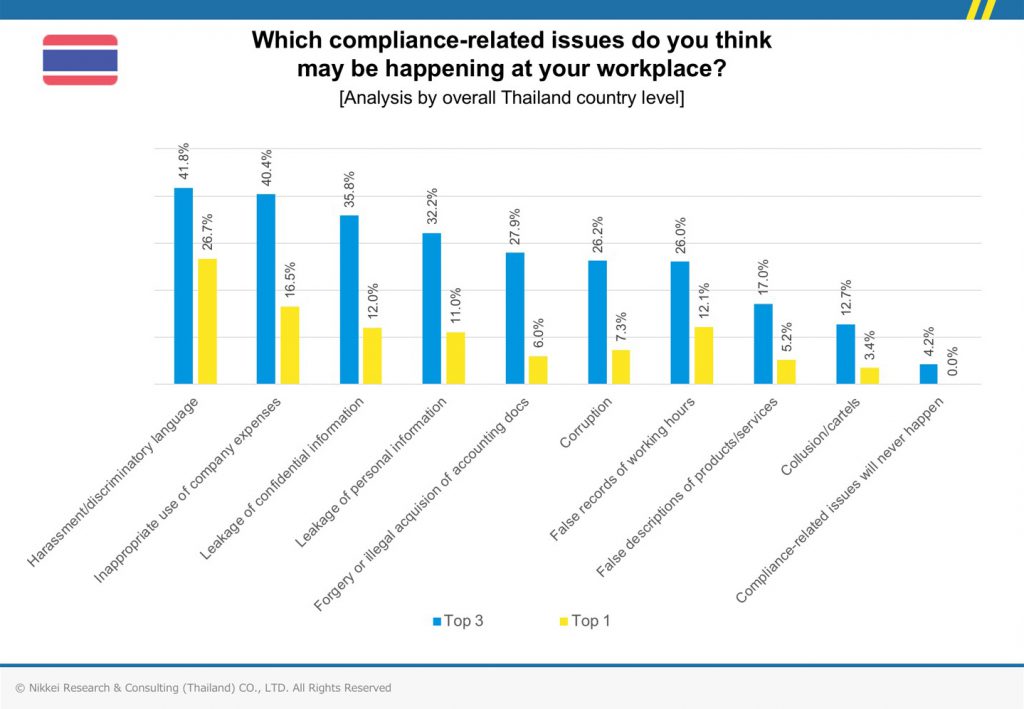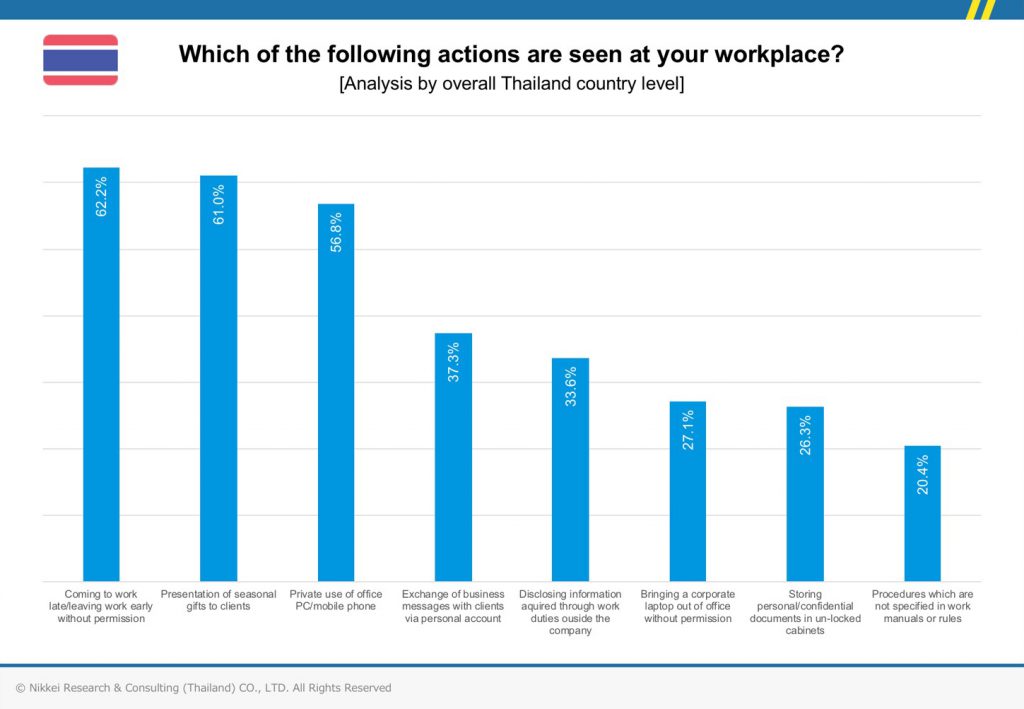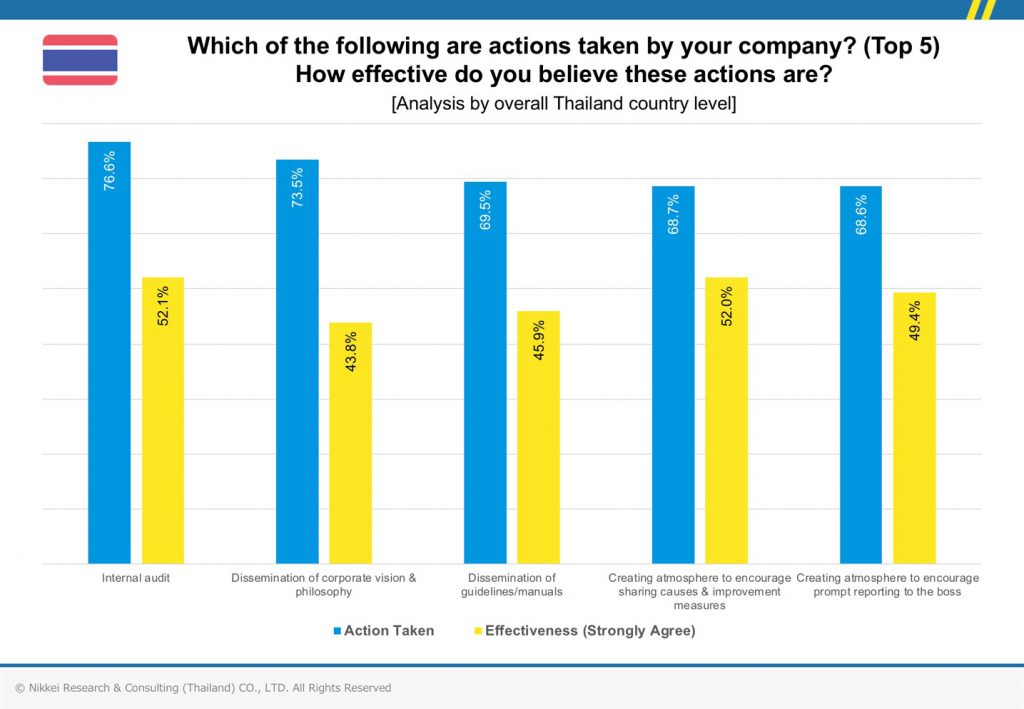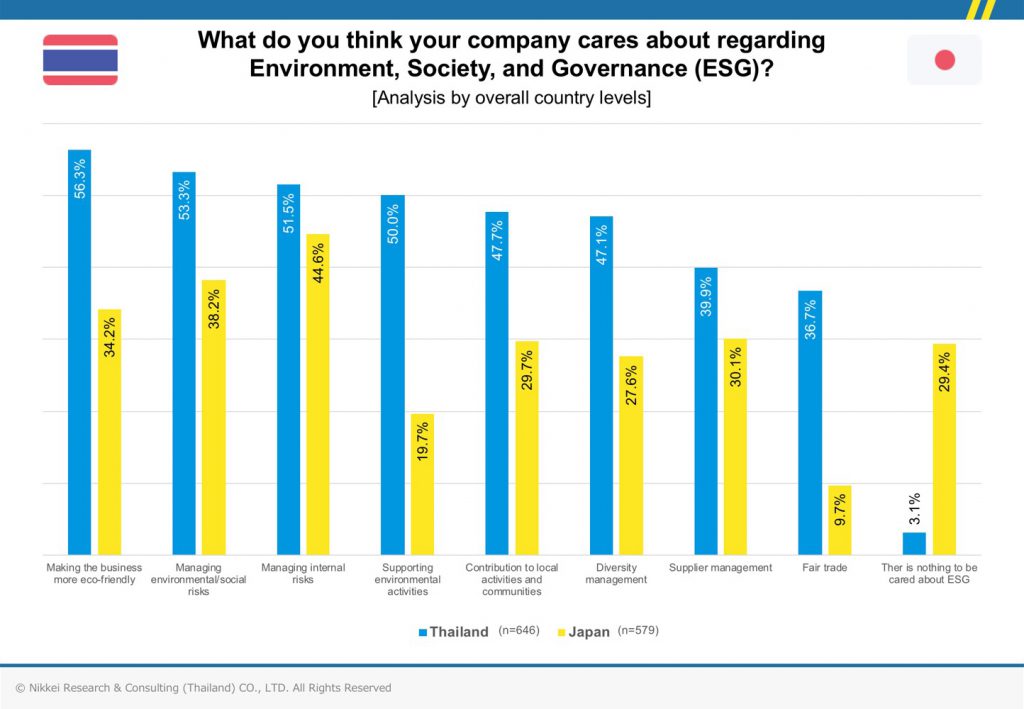In our previous article, we looked at awareness, perceptions, and understanding of corporate compliance in Thailand. We will now look into details of what companies are currently doing in terms of issues faced, initiatives taken, and priorities going forward. These are the results from our Nikkei Research & Consulting (Thailand) online survey* to study corporate compliance practices of companies in Thailand and Japan.

Issues
What seem to be the most common compliance-related issues happening in companies in Thailand? We asked employees working in companies in Thailand to specify up to the top three issues they think may be happening, as well as the top one issue that seems to happen the most at their workplaces.

When looking at the top three, the most common issue mentioned was harassment or discriminatory language (41.8%) followed by inappropriate use of company expenses (40.4%) and leakage of confidential information (35.8%). But if we look at the top one most common issue, the top two remain the same while false records of working hours (12.1%) jumps in the third most cited issues, just slightly ahead of leakage of confidential information (12.0%).
Harassment was also the most commonly cited issue in companies in Japan (58.9%) which may reflect how workplaces do not currently regulate this problem while more people are aware of it as more than just a cultural problem. Expense usage and information leakage issues may reflect intended or unintended negligence due to loose systems or protocols. While these issues may seem like minor violations compared to illegal activities such as corruption and collusion/cartels, such cases may reflect the culture of the organizations as well as the working systems currently in place. If small situations can be easily overlooked or dismissed, bigger risks may go undetected until it’s too late.
Looking at other types of cases, we asked Thai employees what are some other actions actually observed at companies in Thailand.

The top issues mentioned were coming to work late or leaving early without permission (62.2%), presentation of seasonal gifts to clients (61.0%), and private use of office PC or mobile phone for personal reasons (56.8%).
In our previous question, issues related to working hours did not come up amongst the top three most common issues. However, when we asked about working hours, this time in a slightly different variation, it now emerges as the most commonly seen action at workplaces. This may suggest that the issue of time is not clearly and consistently seen as a compliance violation. In any case, this seemingly small issue can lead to bigger internal conflicts, as those who regularly come to work and leave work on time may feel they are being unfairly treated.
The practice of presentation of gifts (including vouchers) may exist due to a long-standing previous way of doing business. However, this practice can be reduced or eliminated if companies shift their way of thinking. As for private use office equipment, these may not be serious violations for some companies, but proper security precautions should be taken to prevent potential risks such as data leakage or accelerated equipment depreciation. Again, these seemingly small cases may potentially lead to bigger problems if companies do not clearly communicate that such issues not encouraged.
Initiatives
What then are some interventions that companies are already undertaking, and how effective are these actions perceived to be by employees? Amongst a list of different initiatives, the following are the top five most common actions that appear to be taken.

The most common initiatives were internal audit (76.6%), dissemination of corporate vision and philosophy (73.5%), and dissemination of guidelines or manuals to prevent compliance violations (69.5%). The perceived effectiveness of these actions, however, were still low overall. Less than 50% of employees strongly agreed that such actions were effective in preventing compliance-related issues, with the exception of conducting internal audit (52.1%) and creating an atmosphere that encourages employees to share causes and improvement measures in the workplace when a mistake or trouble happen (52.0%). Training initiatives, such as those related to personal information protection (63.0%) or to prevent fraud or mistakes (59.1%) were also conducted, but just outside of the top five most common actions that employees mentioned.
Priorities
In addition to corporate compliance issues, we also asked what employees to look at a broader perspective, about what they believe their company cares about regarding Environment, Society, and Governance, or ESG.

The top priorities were making the business more eco-friendly (56.3%), managing environmental/social risks (53.3%), and managing internal risks such as fraud, discrimination, or violation of laws (51.5%). These were the top three priorities for companies in Japan as well, but in reverse order and slightly lower percentages. The biggest gaps in current level of priority were regarding supporting environmental activities (30.3%) and fair trade (27.0%). This could be due to different standards towards ESG or companies in Japan already currently doing such activities as part of their normal business compared to companies in Thailand. In addition to the overall goals of rules and regulations of corporate compliance, these broader ESG goals help to prioritize trust and transparency by measuring long-term value creation capability and sustainability of companies.
Looking Ahead
These are some of the current situations and scenarios happening in companies in Thailand regarding corporate compliance. Based on what is actually happening within your company, the proper actions can be taken to fix any violations and prevent any further risks. In the upcoming and final article in our corporate compliance series, we will focus on the people aspects – who employees reach out to with their concerns, their preferences regarding communications, problem solving, and expected work experiences, and how companies can take actions to ensure compliance readiness while building sustainable foundations for future growth.
* Nikkei Research & Consulting (Thailand) online research survey conducted during January 2020 with full-time employees of companies in Japan (n=579 nationwide) and Thailand (n=646 Bangkok metropolitan area).

![[ウェビナー開催しました] コロナ危機が与えた「海外マネジメント」の試練とその変化とは(5月28日開催済み)](https://www.nikkei-rc.com/wp-content/uploads/2020/05/together-250x160.png)

![The Salary Reports 2022 (Asia) are now published– サラリーレポート2022・アジア編 発売のお知らせ [日経リサーチ]](https://www.nikkei-rc.com/wp-content/uploads/2021/01/image_for_column_nikkei_Jan2021-scaled-250x160.jpg)